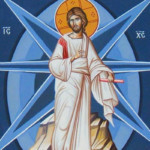Brothers and sisters, we have reached the third Sunday of Lent. In the Gospel, we witness an unusual scene in the life of Jesus. Rarely do we find him angry and violent in the Gospels. He drives the merchants out of the temple, overturns the tables of the money-changers, and declares that His Father’s house is a house of prayer and not a den of thieves.
The temple in Jerusalem was not only the site of religious ceremonies but also the economic lungs of Israel. It was there that export-import exchanges were made and the exchange of foreign currencies. Also there was the great market of animals for sacrifice (sheep, calves, doves, etc.) and the sale of animal skins that the country exported in quantity. This economic aspect had taken precedence over the very purpose of the temple as described by Christ, namely, the house of prayer. It is a prophetic and symbolic rejection of the centralization of the religious, economic, and political system of Judaism that he manifests by his act.
However, Jesus was not only speaking out against this system, there were also masses of people oppressed and robbed by the system. This is why Jesus speaks of a den of thieves. The markets are always full of traffickers, shamelessly exploiting crooked traders, bandits, and it is dangerous that this is a sacred place that lends itself to let their activities flourish. Obviously the protest against this central structure of Judaism, which Jesus symbolically ratifies, threatens the power and privileges of those who profit from it. Therefore, it is no surprise that the sacred aristocracy, especially the priests and scribes whose custody of the temple is in their hands, are beginning to look for ways to destroy it.
The Jews asked him for explanations for what he was doing. They found his act scandalous but did not realize that the real scandal was to have transformed the temple into a place of traffic where injustices were taking place. In traditional African religions, it is said that sacred places must always be cleaned. In addition to sweeping, it is demanded that these sacred places be places where enemies are reconciled, places where words of curse are transformed into words of blessing. It is a way of removing, like Christ, from the sanctuaries objects of traffic and sin.
Jesus further scandalized the Jews by asking them to destroy the temple so that he could rebuild it in three days. He makes a prophetic announcement. He reveals that it is the new temple not made by human hands but built by God. These detractors will destroy him by putting him to death, but three days later, he will come back to life.
We Christians are forming the body of Christ, in other words, this new temple. Each one of us is an element in the construction of this temple. The time of Lent is the time of purification of the temple. Let Christ cast out in us that which does not honor God. Let us make ourselves the temple of the Holy Spirit by refusing to make our bodies places of commerce and traffic, but a dwelling place of God.
The first reading presents us with the 10 commandments that God assigns to His people whom He has just freed from the slavery of the Egyptians. Let us be freed by Christ from the various slavery by embracing the commandments of God. These commandments make the bunch of slaves, people consecrated to God having His constitution. All these commandments aim at forbidding Israel to enslave or subject anyone into slavery. Christ will sum up all the commandments in the love of God and the love of neighbor. To love then means to purify oneself from any desire to enslave others and to arm oneself for one’s service by flying to one’s aid.
One must give oneself up to serve the supreme gift of one’s life as Christ did. It is in this God who gives Himself to the point of exhaustion that we believe. He died to redeem us. For the Jews, this is a scandal and for the Gentiles, it is madness. But for us, it is God’s wisdom that hides unfathomable mysteries. It is irrational, but our faith gives it logic. “The follies of God are wiser than men, and the weakness of God is stronger than men,” St. Paul tells us.
Do not cease, Lord, to raise us up every time we fall. Help us to cast out of Your temple, which is our body, all acts and objects of sinful trafficking, so that we may come to Your resurrection at Easter with a heart free from all defilement




